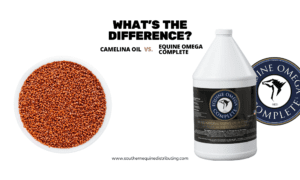Equine supplements and feeds on the market offer a wide variety of oils. Research conducted by reputable firms, educational institutions, and feed companies has shed light on the unique benefits of these oils for horses.
Multiple studies consistently highlight the importance of including oils rich in long-chain omega-3 and omega-6 fatty acids in horses’ diets. These oils have shown remarkable results in various research studies, especially in terms of promoting horse health.
One particular oil that stands out is fish oil, known for its high content of EPA and DHA. Research has demonstrated that supplementation with fish oil can reduce inflammation, enhance immune function, support fertility, and improve respiratory health in horses.
In a recent study involving thoroughbred horses, supplementation with fish oil for four months resulted in increased serum levels of EPA and DHA. Conversely, horses supplemented with other oils showed a decrease in serum levels.
Furthermore, research has indicated that omega-3 fatty acids derived from fish oil can significantly benefit horses with respiratory issues. Horses supplemented with omega-3 fatty acids demonstrated a remarkable 60% improvement in cough scores and a 33% reduction in cough frequency.
Evidence also supports the positive impact of fish oil supplementation on reproductive health in mares, foals, and stallions. Omega-3 fatty acids have been shown to enhance broodmare health and semen quality in stallions. Additionally, foals whose colostrum was influenced by omega-3 fatty acids displayed improved memory and cognition.
When considering equine supplements and the benefits of different oils, it is crucial to examine the supporting data and evidence for each product. By choosing oils with proven efficacy, horse owners can ensure optimal health and performance for their beloved equine companions.
With the right knowledge and evidence-based decision-making, you can provide your horses with the supplements they need to thrive.





